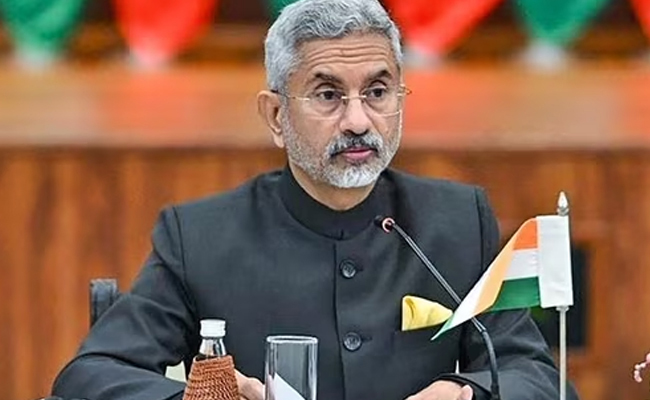New Delhi (PTI): India on Friday announced that External Affairs Minister S Jaishankar will travel to Pakistan to attend a conclave of the Shanghai Cooperation Organisation (SCO) in mid-October.
It will be for the first time in nearly nine years that India's external affairs minister will travel to Pakistan even as the ties between the two neighbours remained frosty over the Kashmir issue and cross-border terrorism emanating from Pakistan.
Pakistan is hosting the SCO Council of Heads of Government (CHG) meeting on October 15 and 16.
The last Indian external affairs minister to visit Pakistan was Sushma Swaraj. She had travelled to Islamabad in December 2015 to attend a conference on Afghanistan.
The announcement on Jaishankar's visit was made by external affairs ministry spokesperson Randhir Jaiswal.
"The external affairs minister will lead our delegation to Pakistan to participate in the SCO summit which will be held in Islamabad on October 15 and 16," he said at his weekly media briefing.
The spokesperson clarified that the external affairs minister is travelling to Pakistan only to attend the SCO summit.
In August, Pakistan invited Prime Minister Narendra Modi to the SCO's summit.
Jaishankar's visit to Pakistan assumes significance as it is seen as a major decision on New Delhi's part.
The decision to send the senior minister is seen as a display of India's commitment to the SCO which has been playing a key role in boosting regional security cooperation.
The ties between India and Pakistan came under severe strain after India's warplanes pounded a Jaish-e-Mohammed terrorist training camp in Balakot in Pakistan in February 2019 in response to the Pulwama terror attack.
The relations further deteriorated after India on August 5, 2019 announced the withdrawal of special powers of Jammu and Kashmir and the bifurcation of the state into two union territories.
Pakistan downgraded diplomatic ties with India after New Delhi abrogated Article 370.
India has been maintaining that it desires normal neighbourly relations with Pakistan while insisting that the onus is on Islamabad to create an environment free of terror and hostility for such engagement.
Pakistan's then foreign minister Bilawal Bhutto Zardari visited India in May 2023 to attend an in-person meeting of the foreign ministers of SCO nations in Goa.
It was the first visit of a Pakistani foreign minister to India in almost 12 years.
The SCO council of heads of government conclave is the second-highest platform in the grouping.
The SCO heads of state summit is the top most forum in the grouping that is generally attended by the Indian prime minister.
The SCO, comprising India, China, Russia, Pakistan, Kazakhstan, Kyrgyzstan, Tajikistan and Uzbekistan, is an influential economic and security bloc that has emerged as one of the largest transregional international organisations.
India was the chair of the SCO last year. It hosted the SCO summit in the virtual format in July last year.
India's association with the SCO began in 2005 as an observer country. It became a full member state of SCO at the Astana summit in 2017.
India has shown a keen interest in deepening its security-related cooperation with the SCO and its Regional Anti-Terrorism Structure (RATS), which specifically deals with issues relating to security and defence.
The SCO was founded at a summit in Shanghai in 2001 by the presidents of Russia, China, the Kyrgyz Republic, Kazakhstan, Tajikistan and Uzbekistan.
Pakistan became its permanent member along with India in 2017.
Let the Truth be known. If you read VB and like VB, please be a VB Supporter and Help us deliver the Truth to one and all.
Panaji (PTI): As part of a crackdown against tourist establishments violating laws and safety norms in the aftermath of the Arpora fire tragedy, Goa authorities on Saturday sealed a renowned club at Vagator and revoked the fire department NOC of another club.
Cafe CO2 Goa, located on a cliff overlooking the Arabian Sea at Vagator beach in North Goa, was sealed. The move came two days after Goya Club, also in Vagator, was shut down for alleged violations of rules.
Elsewhere, campaigning for local body polls, AAP leader Arvind Kejriwal said the fire incident at Birch by Romeo Lane nightclub at Arpora, which claimed 25 lives on December 6, happened because the BJP government in the state was corrupt.
An inspection of Cafe CO2 Goa by a state government-appointed team revealed that the establishment, with a seating capacity of 250, did not possess a no-objection certificate (NOC) of the Fire and Emergency Services Department. The club, which sits atop Ozrant Cliff, also did not have structural stability, the team found.
The Fire and Emergency Services on Saturday also revoked the NOC issued to Diaz Pool Club and Bar at Anjuna as the fire extinguishers installed in the establishment were found to be inadequate, said divisional fire officer Shripad Gawas.
A notice was issued to Nitin Wadhwa, the partner of the club, he said in the order.
Campaigning at Chimbel village near Panaji in support of his party's Zilla Panchayat election candidate, Aam Aadmi Party leader Kejriwal said the nightclub fire at Arpora happened because of the "corruption of the Pramod Sawant-led state government."
"Why this fire incident happened? I read in the newspapers that the nightclub had no occupancy certificate, no building licence, no excise licence, no construction licence or trade licence. The entire club was illegal but still it was going on," he said.
"How could it go on? Couldn't Pramod Sawant or anyone else see it? I was told that hafta (bribe) was being paid," the former Delhi chief minister said.
A person can not work without bribing officials in the coastal state, Kejriwal said, alleging that officers, MLAs and even ministers are accepting bribes.





